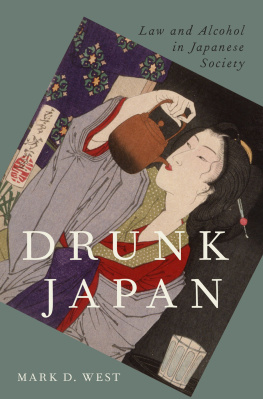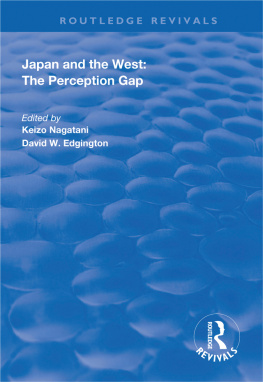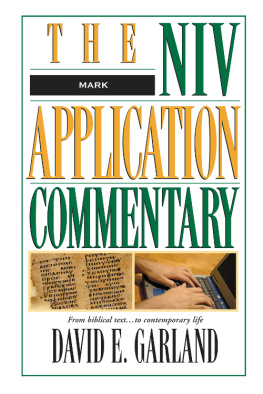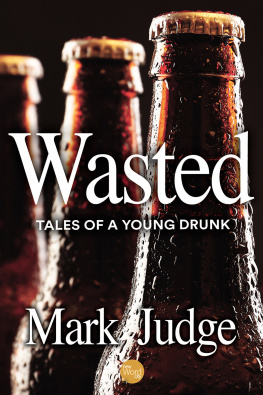West Mark D. - Drunk Japan
Here you can read online West Mark D. - Drunk Japan full text of the book (entire story) in english for free. Download pdf and epub, get meaning, cover and reviews about this ebook. year: 2020, publisher: Oxford University Press USA - OSO, genre: Politics. Description of the work, (preface) as well as reviews are available. Best literature library LitArk.com created for fans of good reading and offers a wide selection of genres:
Romance novel
Science fiction
Adventure
Detective
Science
History
Home and family
Prose
Art
Politics
Computer
Non-fiction
Religion
Business
Children
Humor
Choose a favorite category and find really read worthwhile books. Enjoy immersion in the world of imagination, feel the emotions of the characters or learn something new for yourself, make an fascinating discovery.
- Book:Drunk Japan
- Author:
- Publisher:Oxford University Press USA - OSO
- Genre:
- Year:2020
- Rating:5 / 5
- Favourites:Add to favourites
- Your mark:
- 100
- 1
- 2
- 3
- 4
- 5
Drunk Japan: summary, description and annotation
We offer to read an annotation, description, summary or preface (depends on what the author of the book "Drunk Japan" wrote himself). If you haven't found the necessary information about the book — write in the comments, we will try to find it.
Drunk Japan — read online for free the complete book (whole text) full work
Below is the text of the book, divided by pages. System saving the place of the last page read, allows you to conveniently read the book "Drunk Japan" online for free, without having to search again every time where you left off. Put a bookmark, and you can go to the page where you finished reading at any time.
Font size:
Interval:
Bookmark:


Oxford University Press is a department of the University of Oxford. It furthers the Universitys objective of excellence in research, scholarship, and education by publishing worldwide. Oxford is a registered trade mark of Oxford University Press in the UK and certain other countries.
Published in the United States of America by Oxford University Press
198 Madison Avenue, New York, NY 10016, United States of America.
Oxford University Press 2020
All rights reserved. No part of this publication may be reproduced, stored in a retrieval system, or transmitted, in any form or by any means, without the prior permission in writing of Oxford University Press, or as expressly permitted by law, by license, or under terms agreed with the appropriate reproduction rights organization. Inquiries concerning reproduction outside the scope of the above should be sent to the Rights Department, Oxford University Press, at the address above.
You must not circulate this work in any other form and you must impose this same condition on any acquirer.
Library of Congress Cataloging-in-Publication Data
Names: West, Mark D., 1968 author.
Title: Drunk Japan : law and alcohol in Japanese society / Mark D. West.
Description: New York, NY : Oxford University Press, [2019] |
Includes bibliographical references and index.
Identifiers: LCCN 2019038103 (print) | LCCN 2019038104 (ebook) |
ISBN 9780190070847 (hardback) | ISBN 9780190070854 |
ISBN 9780190070861 (epub) | ISBN 9780190070878
Subjects: LCSH: AlcoholismSocial aspectsJapan. | Drinking of alcoholic
beveragesSocial aspectsJapan. | Liquor lawsJapan.
Classification: LCC HV5613 .W48 2019 (print) | LCC HV5613 (ebook) |
DDC 362.2920952dc23
LC record available at https://lccn.loc.gov/2019038103
LC ebook record available at https://lccn.loc.gov/2019038104
For Amber
When a stranger in Japan tries to strike up a conversation with me in Japanese, there is a nontrivial chance that the subject of alcohol will arise. Sometimes Im asked if I like sake or Japanese beer, and occasionally I receive an alleged compliment like You look like someone who can drink a lot. I dont, really, at least not in the U.S. But some people in Japan think non-Japanese people can hold their liquor relatively well, so to them, I might, in fact, look like a person who can drink a lot.
I actually cant drink a lot, and even if I could, I doubt I would. But since I began living, traveling, studying, and working in various capacities in Japan in the 1980s, I have drunk every drink and visited almost every type of drinking establishment mentioned in the judicial opinions that form the basis for this book. I take no pride in that whatsoever, but you should know it.
Perhaps more significant, I have shared drinks in Japan with carpenters, baseball players, sushi chefs, schoolteachers, mechanics, farmers, sumo wrestlers, salarymen, CEOs, artists, engineers, actors, mobsters, and priests (Buddhist, Shinto, and Catholic), as well as legislators, bureaucrats, lawyers, law professors, prosecutors, and police officers. And yes, Ive shared drinks with some of the judges who authored the court opinions that are the core of this book. Im glad I had these varied experiences with wonderful people, and I learned a lot from them. (I cant say the same for them; the combination of my inability and unwillingness to keep pace, at least for the past twenty-five years or so, makes me a bit of a buzzkill.) But there is nothing unusual about these experiences for someone who has spent as much time in Japan as I; they simply reflect life in Japan, or at least segments of it, and they happen to correlate with the stories that are the subject of the book. Still, I wont litter the book with personal anecdotes, as they would merely reflect my singular perspective.
That perspective (and yours) necessarily is informed by observations of other drinking cultures. In fact, it was only after I became thoroughly ensconced in this project that I realized my curiosity about drinking culture is chronic. I spent most of my early childhood in the rural South, with no alcohol in my home, ever, but surrounded by it in ways I did not fully grasp until I was an adult. An hour and a half by car but effectively a world away from New Orleans, I heard rumors of beer on fishing boats, found puzzling the fact that some people apparently used the 70-percent alcohol concoction known as Dr. Tichenors antiseptic for things other than mosquito bites, and speculated about the mystery that lurked inside the dark building in Sun, Louisiana, with the lighted sign advertising Jax beer; it was the only bar I knew. (The bar burned down and the brewery is now defunct.) I wanted to know more, and apparently I still do.
Fortunately, the court opinions allow us to focus largely on the judges perspectives, lessening, but not eliminating, biases that I might introduce as a narrator. For readers with experience in Japan, I hope you will both gain new insights and catch glimpses of the familiar through the judicial lens. For readers for whom this is new territory, I hope youll be equally intrigued by the unfamiliar evidence the law provides about what lurks not only inside in the dark buildings but also across the especially well-lit landscape of drunk Japan.
I owe a tremendous debt to the University of Michigan Law School, my academic home since 1998. The idea for this book grew directly out of conversations with Michigan Law students in my Japanese Law and Criminal Law classes. My colleagues on the Michigan Law faculty have shaped my work in enormous ways: by scholarly example, with critical comments, and through discussions that help define our community values. Financial support was provided in part through the endowments of the Nippon Life Insurance Company and the Sumitomo Bank, Ltd., at the Law School, as well as contributions to the school from Mori Hamada & Matsumoto.
I worked on this book while serving as dean. The book is a reflection of my belief that deans who maintain the intellectual curiosity that led them to higher education are more effective leaders. In most cases they should look for opportunities to do at least one thing they did before becoming dean: teaching, research, service. Its impossible to do any of those things without significant support from many people who care about the institutions success. Im especially grateful to Robyn Grimes, Rachel Perrell, Shelley Rodgers, Gil Seinfeld, Michele Frasier Wing, and Sarah Zearfoss.
I am thankful for the helpful comments on the manuscript that I received from Allison Alexy, Paul Christensen, Don Herzog (twice!), John Hudson, Lisa Liu, Kyle Logue, Curtis Milhaupt, Bill Miller, Markus Nornes, Bill Novak, Mark Ramseyer, and Kiyoteru Tsutsui. Atsushi Kinami read the manuscript and generously sent me source materials that I would have missed without him.
This book is dedicated to my wife, Amber, whose support was essential and whose feedback was vital despite the fact that, or perhaps because, she is allergic to alcohol.
Case reporters often use pseudonyms for party names for privacy reasons. Unless otherwise stated, if the case reporter uses the real name of a party, or if I can determine the name from press accounts, I use it. If not, to keep the players straight and to preserve some humanity in the opinions, I occasionally choose different pseudonyms for the parties. Following the convention in Asian studies, Japanese names in the text are presented in the conventional Japanese order, with family names first. Also following convention, I reverse the rule in endnote citations and when Japanese people living outside Japan choose to follow the opposite order.
Font size:
Interval:
Bookmark:
Similar books «Drunk Japan»
Look at similar books to Drunk Japan. We have selected literature similar in name and meaning in the hope of providing readers with more options to find new, interesting, not yet read works.
Discussion, reviews of the book Drunk Japan and just readers' own opinions. Leave your comments, write what you think about the work, its meaning or the main characters. Specify what exactly you liked and what you didn't like, and why you think so.








